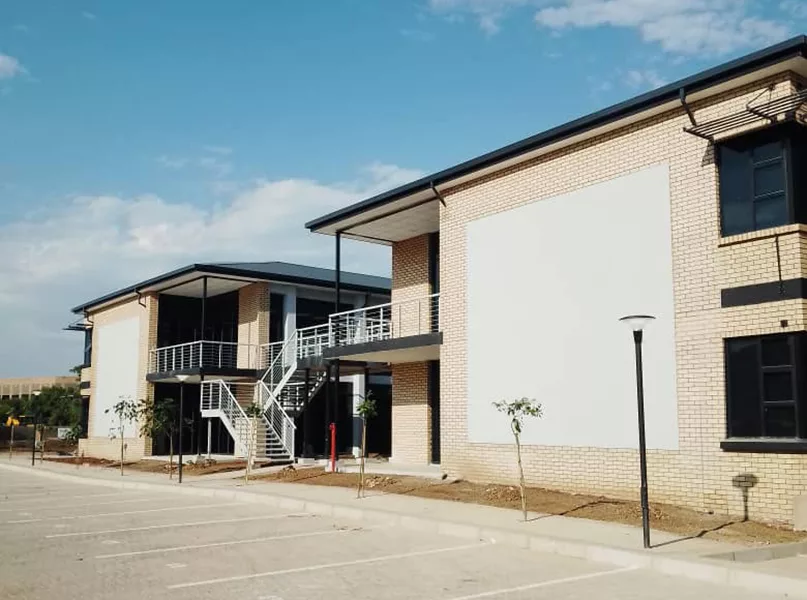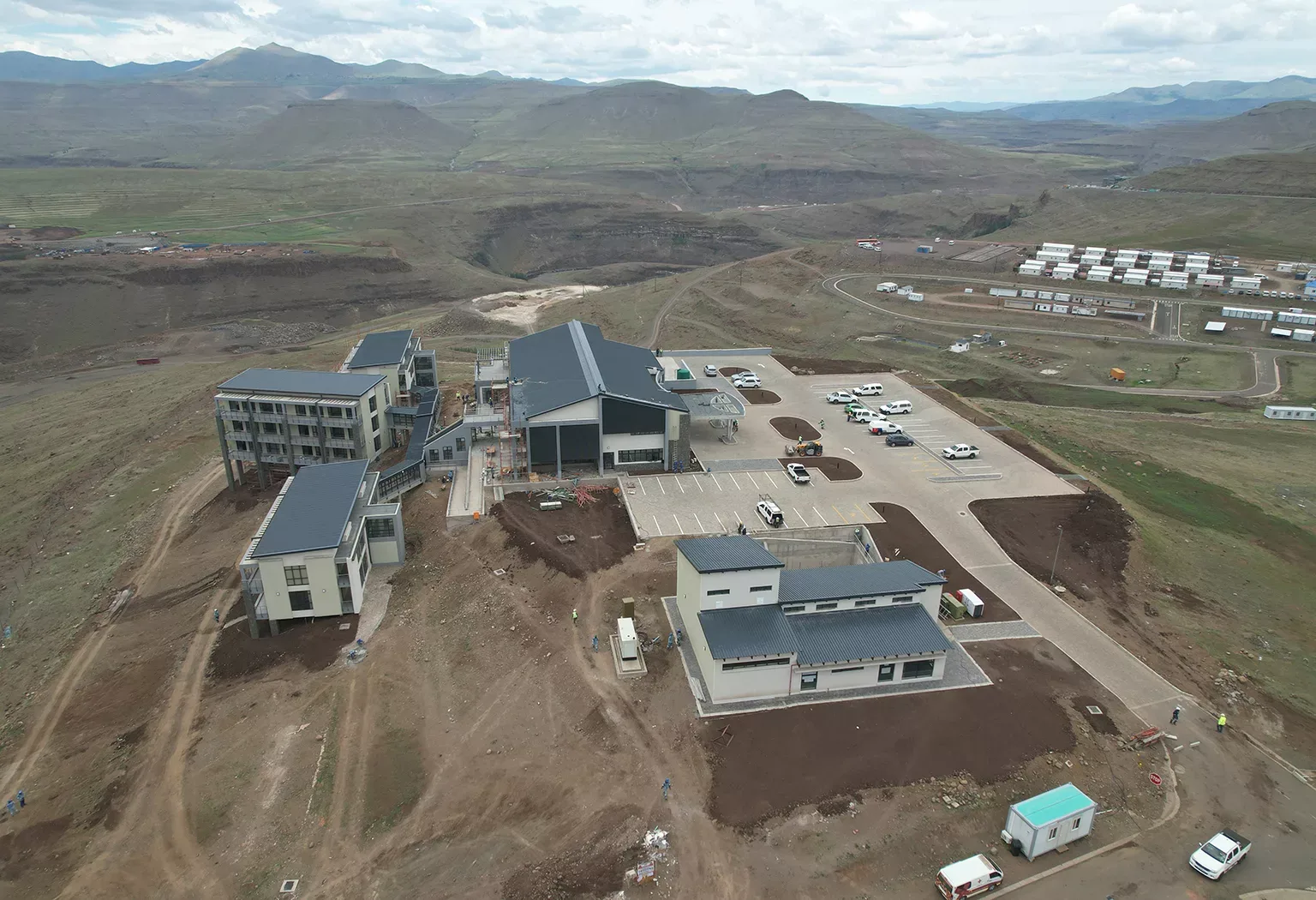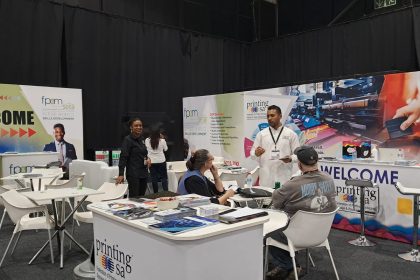An unpredictable economic landscape has resulted in continued modifications within the African construction industry of late. Deon Robinson, Managing Director of WBHO Building Africa, shares how his company stays abreast of these changes.
FIRM FOUNDATIONS
As the African construction industry continues to face political instability, currency fluctuations, and associated turbulence, many businesses have been left picking up the pieces.
However, the robust business model of WBHO Construction Pty Ltd (WBHO), built on a foundation of trusting client relations, meticulous planning, and a strong and dependable team of employees, has ensured that the company is able to rise above any challenge.
Whilst staff and resources can sometimes be limited, and varying conditions present obstacles, WBHO prides itself on implementing forward planning to ensure that projects can always be completed on time and within budget.
“As we all know, there are certain countries where the risk is just too high, so we choose locations where we have a footprint and understand the local people, local law, and the weather conditions,” opens Deon Robinson, Managing Director of WBHO Building Africa.
Robinson has been fascinated by the construction industry for over 33 years. His involvement in WBHO over the past 14 years has seen him participate in cross-border projects whilst experiencing a variety of cultures and countries has been of interest, including projects within South Africa’s borders.
“The dynamics of working across borders are very different from inland projects, and you get to meet and understand people from all different countries and diverse cultures,” he explains.
Robinson, whose commitment to the African construction market remains strong, believes that wider external investment will help it to grow.
“There is huge potential in the African market, and there are investors out there who will spend their money in stable regions, so we just have to be patient and look out for the right opportunity,” Robinson clarifies.
DIFFERENT FROM THE COMPETITION
As a company, WBHO prides itself on standing out from the crowd. According to Robinson, this can be attributed to a company culture that WBHO has worked hard to cultivate, where employees take priority.
“It boils down to a culture where safety, training, recognition, and the future of all our employees are our highest priority,” Robinson explains.
Compared to others, WBHO is a company that possesses considerable continuity within the construction industry, whilst its senior management team is experienced, well-versed, and capable.
Indeed, for WBHO, it is the people behind the company that make all the difference, both in terms of capability and in securing the sustainability of the enterprise itself.
Within the landscape of South Africa’s renewable energy infrastructure, WBHO is growing. As an area of attention for future development, the company recognises that the renewable energy market has the potential to expand WBHO nationally and further into the rest of the world.
Africa’s renewable energy output is not currently on par with that of sustainability giants in Europe. Going forward, however, the company is hopeful for change.
With an abundance of natural wind and sunshine to facilitate the production of renewables, and as the industry is only just taking off in the country, Africa is well equipped to fuel a considerable renewable energy revolution.
“It boils down to a culture where safety, training, recognition, and the future of all our employees are our highest priority”
Deon Robinson, Managing Director, WBHO Building Africa
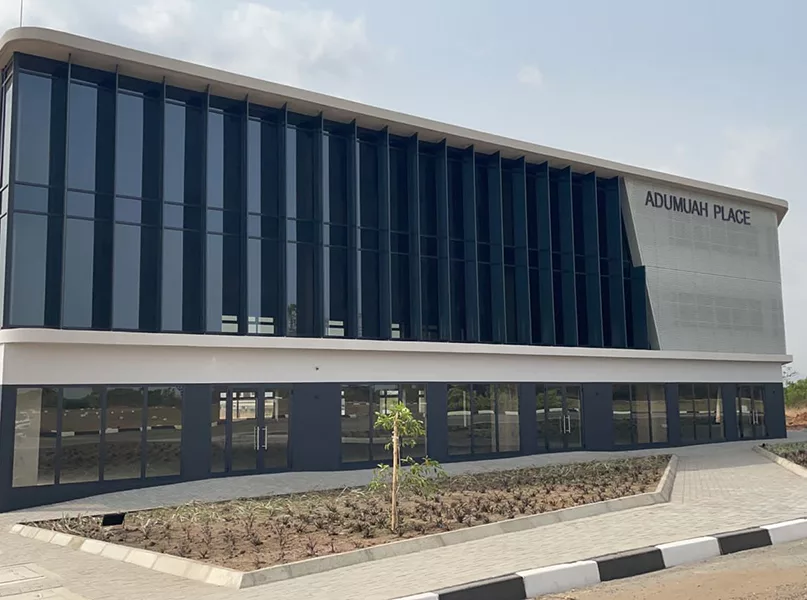
ONGOING PROJECTS
Having established a reputation for quality, reliability, and timely delivery, WBHO regularly exceeds client expectations.
The company carries out office and commercial building construction, including retail, hotels and resorts, healthcare, leisure, recreation, and education, as well as residential projects.
“WBHO is recognised as a leading principal contractor in the African building industry,” Robinson informs.
The company’s many construction projects, distributed around the continent, are emblematic of its recent success.
WBHO’s standalone West Africa office in Ghana, where the company has been based for over 20 years, oversees many of its developments. Projects in Ghana primarily take place in the country’s capital, Accra. Construction was initiated when WBHO realised that, following the COVID-19 pandemic, the market and economy in Ghana began to pick up between 2022 and 2023.
The company’s operational staff at all Ghanaian sites are motivated and hard-working, ameliorated by WBHO’s ‘employees first’ attitude at both on-the-ground and management levels. WBHO is also focusing on moving into the data centre space, and further concentrating on residential construction.
Project Zambia, completed in late 2023, took place in Lusaka, where the iconic InterContinental Lusaka and Holiday Inn Hotels were refurbished to create a social attraction in the city. Upgraded conference facilities in the structures feature new technological advancements, whilst external works to the pool areas have been included in the refurbishment.
This project can be seen as a prime example of WBHO’s positive relationship with its subcontractors, such as on-site agents, quantity surveyors, engineers, and foremen. To foster positivity in this instance, WBHO conducts biweekly meetings in which the company’s values of collaboration and teamwork are prioritised. WBHO understands that, without its subcontractors, its projects could not be completed.
WBHO’s Botswana-based projects include the Botswana Accountancy College and a refurbishment of the Diamond Trading Centre (DTC), both of which are located in the capital city of Gaborone.
These projects can be seen as emblematic of the company’s successful importation of materials from a range of suppliers, in which the logistics and procurement supply chain plays an important role.
Finally, Project Lesotho, located in Polihali Village in the country’s Mokhotlong District, will entail the construction of 110 permanent housing units, a visitors’ lodge including a 32-key boutique hotel, a school, a recreational centre, and a sports facility, with a gross site area of 14,500 square metres (sqm).
The planned construction is located on top of a mountain, overlooking the future dam wall and reservoir; the project’s location is symbolic of WBHO’s elevated reputation as a result of its recent growth.
INVESTING IN EMPLOYEES
WBHO brings expertise to each new undertaking to ensure a guaranteed level of quality and reliability while also presenting the company as a hub for professional development and growth.
To celebrate hard work, employees are rewarded with an empowering workplace environment that prioritises training and nurtures talent to ensure that the business grows and develops future leaders from within.
Training and staff development is a major focus of investment in allowing WBHO to securely and sustainably deliver the levels of quality, safety, and reliability that its name is synonymous with.
The company ensures that its most senior people are involved in the talent hiring process. Successful candidates then embark on mentorship programmes with more senior candidates, who follow their progress on the scheme and regularly check in on them, both professionally and personally.
Prospective employees also undertake vacation work on WBHO projects, where they gain invaluable on-site experience. After graduating from various bursary schemes and employment drives, and joining WBHO full-time, they will attend engineering schools, beginning with an initial and extensive introduction to both the company and the wider industry.
As they progress, employees can choose to specialise in engineering topics before being qualified in a specific area. Those who go on to advanced engineering school will have been in education for close to 10 years.
In addition, young engineers and quantity surveyors are offered further guidance with various support systems within WBHO to become professionally registered through the South African Council for the Project and Construction Management Professions (SACPCMP), the Engineering Council of South Africa (ECSA), and Management Development Programme (MDP) courses.
Those that emerge with management development qualifications usually opt to fulfil a managerial role within the wider WBHO corporation.
Finally, sponsorship programmes for engineers and quantity surveyors are also designed to pair directors with trainees as a means of further progression.
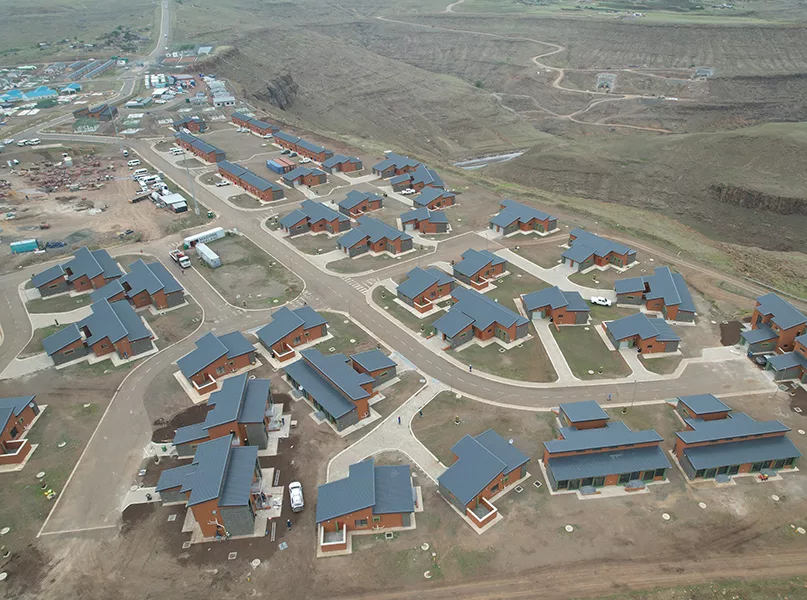
POWERFUL PRODUCTION
At present, a large portion of WBHO’s business model is based on engaging with speciality subcontractors that undertake a large proportion of labour, reducing the need to maintain a large complement of staff.
However, this model differs from country to country; for example, WBHO directly employs 70 percent of the labour involved in Project Lesotho and Polihali.
On the production side of the business, WBHO has a structured training programme whereby foremen attain a South African National Qualifications Framework (NQF) registration or follow an accredited skills development course.
“These are people who typically don’t have a diploma or a degree but possess many years of construction experience and have come up through our ranks. We have a huge push to get them through these programmes, and currently, more than 80 percent of our foremen have these accredited qualifications,” Robinson shares.
“The main objective in the coming year is to grow the order book and create more job opportunities in select African countries.”
These comprehensive programmes ensure that all WBHO talent is well-equipped and prepared to hit the ground running, with a solid understanding of what is expected of them and how to perform their work safely in an environment that respects them and their contributions.
WBHO prides itself on a target of zero harm to all people at its workplaces. The company believes that this begins with leadership and a strong commitment to having a safe organisation, whilst this ethos is cultivated and prioritised through the collective behaviours and actions of every person in the workplace.
On its Polihali project alone, WBHO carried over 2.7 million working hours, in which none was lost to injury time. Notably, the Building Africa division as a whole has avoided lost injury time for over 13 years, owing to its passionate commitment to health and safety.
“Safety, training, recognition, and the future of all our employees are our highest priority,” concludes Robinson.
